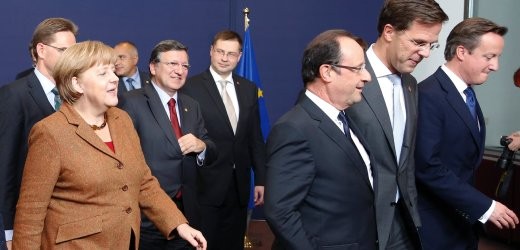(VOVworld)- 27 European Union leaders gathered in Brussels on Thursday to discuss issues that have split the bloc over the past few months. High on the agenda will be Greece’s debt crisis, Britain’s institutional reform, tensions with Russia, and illegal migration.

European Union leaders were unable to reach agreement on Thursday night in Brussels.(photo: spiegel.de) |
Greece’s debt crisis tops the agenda. At the end of an extraordinary Eurozone summit on June 22, EU President Jean Claude Juncker expressed concern about the progress of negotiations between Greece and its creditors, which include the EU, the European Central Bank, and the International Monetary Bank. Juncker called on involved parties to resume talks. The aid package of 7.2 billion euros (8 billion USD) is still unpaid. The EU has asked Greece to make further reforms to prevent a bankruptcy.
Greece under pressure
EU countries including Germany are putting pressure on Greece, complaining that the Greek government’s policies and attitude in negotiations are not clear and constructive. They refuse to make any further concessions and say they want to keep Greece in the eurozone but not at any price. This means Greece might leave the eurozone unless it makes the reforms requested by its creditors.
A few hours before the summit, EU countries signaled that they would be more concessive if Greece agrees to a more acceptable solution. This concession could be short-term debt deferment for Greece, allowing Greece to stay in the eurozone. But it won't help Greece settle with its public debt burden of 177% of GDP.
Fostering monetary alliance
The public debt crises in Greece and other countries have blurred the image of a prosperous EU. Repeated arguments over relief aid and, austerity reveal the poor health of the EU economy. EU leaders believe that the stability of the eurozone depends on a deeper integration and a longer-term goal. At the recent EU summit, EU leaders discussed in detail the integration of the eurozone which was proposed by EU President Jean Claude Juncker and ECB President Mario Draghi. The discussion focused on launching a banking union with new regulations and new bonds and revising the European Common Treaty, the bloc's highest legal document of the bloc.
Though it is a unified market, there are two currency systems in the European union: the euro and domestic currencies such as the British pound sterling, the Danish krone, and the Polish Zloty. Experts agree that these currencies need to merge. Otherwise it will be difficult to set up common financial institutions.
Institutional reform or let the UK leave
Also high on the agenda of the EU summit is Britain’s membership. UK Prime Minister David Cameron and his Conservative Party faced challenges in the European Parliamentary Election in 2014 and the UK election this year. The increasing integration of the eurozone poses threats to Britain’s financial sector and services. Recent surveys in the UK show that most British people want to leave the EU. But this idea has drown criticism from other EU members. The President of the European Commission Jose Manual Barosso chastised the UK for its narrow-minded intention to protect its own interests.
Prior to the EU summit, UK Prime Minister Cameron made a tour of Europe to set up a discussion on Britain’s membership at the summit. Immigration and tensions with Russia will also be discussed at this summit.
Anh Huyen